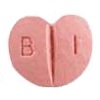
 USA/Canada
USA/Canada 
 UK
UK 
 Australia
Australia 
|
Zebeta
Zebeta is used to treat patients with high blood pressure patients. It can be used alone or with other drugs.
Zebeta 10 mg
Zebeta 5 mg
Drug Title Zebeta (Bisoprolol) Drug Uses Zebeta is used to treat patients with high blood pressure patients. It can be used alone or with other drugs. Mode of Application A normal dose of Zebeta is 5 or 10 mg once a day, although the dose of 20 mg/day is also allowed. Some patients, such as those with severe kidney, liver and lung diseases may be given 2.5 mg a day. Zebeta can be taken during or after the meal. Mechanism of Action Zebeta blocks the action of the sympathetic nervous system on the heart by blocking the heart 's beta-adrenergic receptors. Beta-adrenergic blocking agents such as zebeta reduce the heart rate and are useful in treating abnormally rapid heart rhythms. Zebeta also reduces the force of contraction of the heart and lowers blood pressure. By reducing the heart rate and the force of muscle contraction, beta-adrenergic blocking agents reduce the heart's need for oxygen. Since angina (heart pain) occurs when oxygen need exceeds supply, beta-adrenergic blocking agents are useful in treating angina. Missed Doses If you miss a dose of this drug, take it on the same day. If you forget until the next day, skip the missing dose. Do not take 2 doses at a time. Overdose Storage Store Zebeta in a hermetic container at room temperature of 59-86 F (15-30 C). Precautions Do not stop taking these medicines after consulting with your doctor. Tell the doctor or dentist that you are using this medicine before you receive any medical or dental treatment, emergency care, or surgery. This medicine may cause drowsiness or dizziness. Do not drive, work with machinery, or perform any other potentially dangerous task unless you know how you react to this drug. For women: If you are planning to become pregnant, discuss with your doctor the benefits and risks of using this medicine during pregnancy. It is unclear if this drug is excreted in breast milk. If plan to be breast-feeding while using this medication, tell your doctor or pharmacist to discuss the risk to the baby. For diabetic patients: This medicine may mask the symptoms of low blood sugar such as increased heart rate. Side Effects Zebeta is usually well tolerated, side effects are mild and transient. Rare side effects include abdominal pain, diarrhea, dizziness, headache, nausea, impotence, slow pulse, low blood pressure, numbness, tingling, extremity coldness, sore throat and shortness of breath. Zebeta can aggravate breathing difficulties in patients with asthma, chronic bronchitis or emphysema. Patients with slow heart rate (bradycardia) and heart blocks (defects in electrical conductivity in the heart), Zebeta may decrease the force of heart contractions which may lead to dangerously slow heart rate and even shock. Zebeta reduces the force of heart muscle contractions and may aggravate the symptoms of heart failure. In patients with coronary heart disease sudden stop of taking the drug may cause deterioration of their condition in case with angina, and sometimes lead to a heart attack. Zebeta can mask the early warning symptoms of low blood sugar and should be used with caution in patients treated for diabetes. If you need to stop taking Zebeta, its dosage should be gradually reduced in one to two weeks. More Information Your doctor can provide more information Zebeta. |
Testimonials
Thank you for wonderful servicing! I received everything I have ordered and bonus pills and discounts you have mentioned. I will recommend you to all my friends. Big thanks once again.
- Steven Hermel. Read more Why Generic?
Generic is a drug that has proven pharmaceutical, biological, and therapeutic equivalence to the brand name drug. In other words, generic has an absolutely identical content, dosage form and has the same qualities of effectiveness and safety as its branded analog.
Secured by

|















